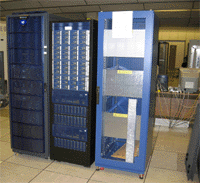Wren (Origin 300)
The SGI
Origin 300 system has been named Wren in honour of the English mathematician
Christopher Wren (1793-1841).
Overview
This system has 16 MIPS
processors, each running at 500 MHz.
This machine is intended to act as an interactive front-end to the
other Origin systems as well as for compilations and manipulating
data on the storage area network (SAN). The only facility for batch
submission to Wren is that provided for single processor compilation
jobs which need longer time limits than might be possible for interactive
sessions. |
 |
Specifications
| Aspect of the system |
Details |
| Processors |
16 x 500 MHz MIPS R14000 processors |
| Memory |
16 GBytes memory |
| Cache hierarchy |
Each processor has 2MB Level
2 cache, 32 KB Level 1 data
cache, 32 KB Level 1 instruction cache |
| Interconnect |
SGI NUMAlink providing sub-microsecond hardware latency, 3-5 microseconds
MPI latency,
sub-microsecond latency for one-sided communications, 6.4GB/s aggregate
bandwidth per brick (4 CPUs). |
| Operating System |
IRIX |
| Partitioning |
This machine is a 16 processor single system image (SSI) |
| Maximum job size |
Wren is intended to be an interactive front end to the other Origin
machines and there is no facility for large scale batch work on
this system |
| Theoretical peak performance |
16 Gigaflops - 16 processors x theoretical peak of 1 Gigaflop |
| Host Address |
wren.cfs.ac.uk |
Configuration Information
Wren is configured with 4 processors set aside for
operating system tasks, 10 processors set aside for interactive access
and 2 available for long compilation jobs which need to be submitted
through the batch system to overcome the CPU time limit imposed on interactive
sessions.
Wren is visible to the outside world as wren.cfs.ac.uk
and X applications can be run directly from an ssh session provided
that X forwarding is turned on at your local machine.
Wren acts as the primary Metadata server for the storage
area network (SAN) and should be used for small jobs and tasks which
have to access a large number of files such as compilations and heavy
use of the tar command.
|

